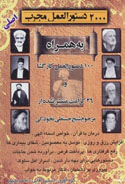کلیپ های دیدنی
مشاوره و خانواده
با توجه به ترک خود ارضایی عوارض آن هنوز در من هست چگونه آن را برطرف کنم ؟
13-08-1399 بازدید:5621 مباحث جنسی و زناشویی همکار پاسخگو

آیا بخاطر وسواس فکری توهین به مقدسات گناه دارد؟
19-05-1398 بازدید:5311 مشکلات و اختلالات روانی همکار پاسخگو
آیا از طریق اینترنت می تواند ازدواج موقت کرد ؟
پرسش: با سلام من 22 سالمه از پارسال با يه دختري در…
از زندگی سیر شدم و آرامش ندارم چکار کنم؟
پرسش : سلام..خواهش ميکنم يه راهي جلو روم بذارين من از…
من از تاریکی شب به دلیل توهمات ذهنیم میترسم چکار کنم؟
پرسش: من وقتي در خانه تنها مي شوم و هوا تاريك…
شب ها كابوس فيلم هاي مبتذل را که قبلا نگاه می کردم میبینم!
پرسش: (در خصوص توبه از ديدن فيلم هاي مبتذل) در اين…
بنده متاهلم و در اینترنت با دختری آشنا شدم که کارمون به گناه کشید!
پرسش: بنده یک مشکلی دارم که می خواستم از شما راهنمایی بخواهم…
جوانی هستم که از زندگی خسته شده و احساس پوچی می کنم!
پرسش: راستش نمی دانم از کجا شروع کنم. 20 ساله هستم…
از طریق اینترنت با پسری آشنا شدم و مدتها با هم در ارتباط بودیم!
پرسش:من دانشجوی ارشد رشته حقوق تقریبا حدود 1 سال پیش…
چرا خانواده ها عاشق شدن را برای جوانان (دختر) بد می دانند؟
پرسش: چرا خانواده ها عاشق شدن را برای جوانان (دختر) بد…
چگونه دیدن فیلم های مبتذل را ترک کنم؟
پرسش: با سلام به حضور حضرت عالي اگرخاطرتان باشد ،من قبلا هم…
با شوهرم قبل از ازدواج رابطه نانشروع داشتم!
پرسش: با سلام من زنی 25 ساله هستم.حدود 1 سال است…
اگر دختری عاشق غیر هم جنس خود...؟
پرسش: اگر دختری عاشق غیر هم جنس خود شود البته نه…
اگر نتوانيم جلو شهوت خود را بگيريم ، چه بايد بكنيم ؟
پرسش: اگر نتوانيم جلو شهوت خود را بگيريم ، چه بايد…
جوانی هستم 21 ساله اهل تهران و تمایل زیادی به سکس دارم
پرسش: من جوانی هستم21 ساله اهل تهران وتمایل زیادی به سکس…
نمي دونم چرا از ازدواج مي ترسم؟!
پرسش: سلام مشکل من اینه که نمي دونم چرا از ازدواج مي…
چرا به زن مطلقه با یک چشم و دید دیگری نگاه می کنند؟!!
پرسش: سلام حاج آقا من یک خانم مطلقه هستم و سوالم اینه…
چرا مخالف رابطه دختر و پسر هستید؟؟!!
پرسش: سلام حاجاقا چند تا سوال داشتم ممنون میشم جواب بدید. 1 چرا…
شب زفاف یا حجله چه شبی است و زن و مرد چکار باید بکنند؟
پرسش: شب زفاف و یا شب حجله که در روایات هم…
چه زمانی برای رابطه جنسی با همسر مناسب است؟
پرسش: چه زمانی برای رابطه جنسی با همسر مناسب است؟ و…
دختری که در سن جوانی و نوجوانی دچار شهوت می شود چه باید بکند؟
پرسش:دختری که درسن جوانی و نوجوانی دچار شهوت می شود…
می خواهم خوب باشم ولی دوست دخترم نمی گذارد!!
پرسش: به دلیل که من مدتی است به شهر آمده ام…
وقتی که عصبانی می شوم دیگر هیچ چیزی دست خودم نیست چکار کنم؟
پرسش: سلام آقای پاسخگو من دارای اخلاق بدی هستم وبا همه خواهر…
من دحتر قبلی نيستم و به يك دختر فاسد تبديل شده ام!
پرسش: من دختري هستم 14ساله من اول دختري سنگين بودم اما…
در مورد وسواسی و راه درمان آن توضیح بفرمایید؟
پرسش: وسواسی چیست و برای درمان آن چه راهکارهایی معرفی می…
خواسگارم بد اخلاق است آیا جواب مثبت بدهم؟
سوال: آیا به پسر بد اخلاق که خواستگاری کرده جواب مثبت…
اخلاقم رُك گفتن است اما حق ميگويم و شوهرم مخالف رفتارم است.
پرسش: اخلاقم رُك گفتن است اما حق ميگويم و شوهرم…
خواستگارم دو ازدواج و یک نامزدی ناموفق داشته جواب مثبت بدم؟
پرسش: خانمی هستم که در گذشته، یک ازدواج_ناموفق داشتم. در حال…
شوهرم گلایه میکنه که چرا همیشه به حرفم گوش میدی!
پرسش: من 20 سالمه 1 ساله ازدواج کردم شوهرم 22 سالشه…
دختر 36 ساله ای که چهره زیبایی ندارد چکار کند؟
پرسش: با سلامدختر 36 ساله اي که مومن و حافظ قرآن…
اختلاف سني پسر با دختر تا چه مقدار ايده آل است؟
پرسش: ميخواستم بدونم ايا ازدواج با دختري که سنش با پسر…
چگونه از انحرافات جنسى به دور باشيم؟
پرسش: در فاصله سنّ بلوغ تا هنگام ازدواج چگونه از انحرافات…
بعضی وقتا اعصابم میریزه بهم با نامزدم بدرفتار میکنم چطورخودمو کنترل کنم؟
پرسش: سلام ببخشید ی سوالی داششتم من دختری۱۸سالم ۷ماهه عقدکردم بعضی…
نقش خانواده در تربيت فرزندان چیست؟
پرسش: نقش خانواده در تربيت فرزندان چیست؟ پاسخ: با سلام و ادب خدمت شما…
نامزدم مي خواهد در كوچه و خيابان آرايش كرده و كمي از موهايم را از روسري بيرون بگذارم!
پرسش: من تا قبل از نامزديم بسيار با حجاب بودم. البته…
چرا برخی مردان در کنار همسرشان آرامش نمی یابند؟
پرسش: قرآن مجيد وجود زن را كانون محبّت و…
علت و شرايط تحقق صيغه چيست؟
پرسش: علت و شرايط تحقق صيغه چيست؟ پاسخ:…
چرا بین دو هوو همیشه اختلاف وجود دارد؟
پرسش: چرا بين دو همسر(زن) با وجود مشروعيّت ازدواج…
پرسش و پاسخ
آیا کسی که شراب بنوشد تا چهل روز نماز و عباداتش قابل قبول نیست ؟
13-08-1399 بازدید:2852 مسائل متفرقه نماز همکار پاسخگو

اذان در جامعه اسلامی نماد چیست ؟ و چرا فقط سه بار در روز تکرار می شود ؟
پرسش: اذان در جامعة اسلامی نماد چیست و…
حکم مشروبات الکلی از دیدگاه اسلام چیست ؟
پرسش: حکم مشروبات الکلی از دیدگاه اسلام چیست…
چرا با این همه ظلم و ستم در جهان امام زمان (عج) ظهور نمی کند ؟
پرسش: چرا با این همه ظلم و ستم…
اگر نگاه به نامحرم گناه است چرا در فیلمهای خارجی زنهای بدون حجاب را نشان میدهند؟
پرسش: چرا میگویند نگاه کردن به نامحرم گناه…

با چه شیوه هایی میتوانیم پیرو انبیاءالهی باشیم ؟
پرسش : چه راه و روشی را پیبگیریم…
چرا زرتشتیان به اعتقاداتشان پایبند هستند ولی مسلمانان نه؟
پرسش : چرا در دین زرتشت گفتار نیک،…
چرا معانی دقیق آیات قرآن مشخص نیست و نیاز به تفسیر دارد ؟
پرسش : به چه دلیل تا تفسیرهای متعدد…
آیا جهت انجام هر کار نامشروعی می توان صیغه جاری کرد ؟
پرسش : اهمیت صیغه کردن در چیست؟ با…
اگر پیامبر (ص) عرب زبان نبود آیا قرآن باز هم به زبان عربی نازل می شد؟
پرسش : اگر حضرت محمد(ص) زبان دیگری به…
آیا در بین پیامبران ،پیامبر خشن هم وجود دارد؟
پرسش : پیامبران به مهربانی معروف میباشند آیا…
با توجه به محاسن روزه آیا معایبی هم در آن هست ؟
پرسش : روزه محاسن بسیاری دارد، آیا این…
جنس خداوند از چه چیزی می باشد و خدا چیست؟
پرسش : جنس خداوند از چه چیزی میباشد…
معنی خدا چیست؟چرا خداوند از حروف دیگر استفاده نکرده است؟
پرسش : تعریف لغوی خدا چیست و چرا…
خال کوبی ابرو (تاتو )از نظر شرعی برای وضو و غسل چه حگمی دارد ؟
پرسش : خالکوبی ابرو (تاتو) از نظر شرعی…
شنیدن صدای زنان در مراسم عزاداری و مولودی چه حکمی دارد ؟
پرسش : شنیدن صدای زنان در مراسم عزاداری…
در چه صورتی امر به معروف و نهی از منکر واجب می شود؟
پرسش : در چه صورتی امر به معروف…
چرا در ایران مردی که از دین خود برگردد حکم اعدام را دارد ؟
پرسش: چرا در ایران مردی که از دین…
آیا ازدواج زن شیعه با مرد سنی اشکال دارد؟
پرسش : آیا ازدواج زن شیعه با مرد…
لمس آیات قرآنی که بر سنگ قبر نوشته شده است بدون وضو چه حکمی دارد ؟
برسش : لمس آیات قرآنی که بر سنگ…
فرق بین احتیاط واجب و احتیاط مستحب چیست؟
پرسش : فرق بین احتیاط واجب و احتیاط…

آیا با زیارت امامان و بوسیدن ضریح آنان انسان دچار شرک می شود؟
پرسش : آیا اعتقاد به این که شیعیان…

چرا در نماز از مهر استفاده میکنیم و فقط پیشانی بر خاک قرار می دهیم؟
پرسش : با توجه به این که هنگام…
آیا علائم هنگام ظهور امام زمان (عج) واقعیت دارد؟
پرسش : آیا وجود نشانههایی هنگام ظهور حضرت…
با وجود مساوات بین زن و مرد چرا مردان در اولویت قرار دارند؟
پرسش : با توجه به این که ما…
طریقه خواندن نماز در زمان رسول خدا (ص) چگونه بوده است؟
پرسش : طریقه نماز خواندن از زمان رسول…
چگونه می توانیم از گناه غیبت پرهیز کنیم؟
پرسش : چگونه میتوانیم از گناه غیبت پرهیز…
چگونه از بدخلقی و صفات زشتم دوری کنم؟
پرسش : چه راهی وجود دارد که انسان…
قطع رابطه با اعضای خانواده که از نظر شخصیتی و اجتماعی مشکل دارند گناه است؟
پرسش : آیا قطع رابطه با افراد خانواده…
آیا روح انسان بعد از مرگ در جسم دیگری دمیده می شود و دوباره به زندگی میکند؟
پرسش : آیا این نظریه درست است که…
اینکه در نماز کاهلی میکنم آیا در دینم خللی ایجاد می شود؟
پرسش : خدا را خیلی دوست دارم،همیشه در…
دلیل علاقه خاص به بعضی از امامان چیست؟
پرسش : چرا برخی برای بعضی امامان ارادات…
در شب اول قبر چه سوالاتی از ما پرسیده می شود ؟
پرسش : شب اوّل قبر چه سئوالاتی از…
آیا دوست داشتن یک نا محرم و ارتباط با او گناه است؟
پرسش : اگر کسی را واقعاً از صمیم قلب…
آیا ادعای ملاقات امام زمان (عج) از جانب برخی افراد صحت دارد ؟
پرسش : بر اساس روایتهای فراوانی امام زمان(عج)…
چرا به اصول و قواعد دین اسلام توجه نمی شود و پذیرش آن از سوی پیروان ادیان دیگر سخت است…
پرسش : دین اسلام کاملترین دینهاست و آسانترین…
آیا نظریه تناسخ از دیدگاه اسلام پذیرفته شده است ؟
پرسش : آیا نظریه تناسخ که بزرگان زیادی…
دست نوشته های طلبه پاسخگو

برای احترام به این ماه هم که شده این کار را انجام بده. مطمئن باش که یاد خدا باعث می شود که هیچوقت به سمت آن اشتباهات نروی.
برای همین یک ماه هم که شده از آن ها صرف نظر کرد و در ضیافت خدا شرکت بنما. بعد از این یک ماه، کیفیت زندگی ات را با گذشته مقایسه کن.
اگر بدتر شده بودی، دوباره به سمت آن گناهان و اشتباهات برو. ولی این ماه چنان عشقی به تو می دهد که دیگر زندگی ات به مانند گذشته نخواهد شد. این ماه خداوند تو را با عشق پذیرایی می کند.
Islam and Its Social System
Islam and Its Social System
We have made you (the true Muslims) a balanced nation, so that you could be an example for mankind. What the Qur'an expressly desires is that the Islamic society should be a model for all those who want to lead a healthy and happy life. It should be a living testimony for the exalted principle that the way to live a healthy life and secure justice and fair play is not closed to human beings. It is they themselves who should find it and follow it with consciousness, faith and persistence.
Society
Man is a being which has for long been social and has been living a collective life. A group of persons living together is called society. Society may be defined as a group of individuals whose life is correlated with each other because they have common desires or common interests for the realization of which they work together. The formation of such a group is sometimes accidental and sometimes intentional. In the former case it is technically called Accidental Society and in the latter Intentional Society.
Accidental society
Suppose you go out to see the museum or to have a walk in the public garden of your town. You find that there are many other people also who have come there for the same purpose. You and they practically form a group having a common object. However, it is evident that the individuals forming such a group had no prior intention to form it., Everyone of them left his house without having had any intention to do so. Such a group is called Accidental Society.
Intentional society
if you want to set up a social, financial, political, or educational institution and you do not have the intellectual, physical and financial potentialities necessary to undertake such a project, you try to find some other persons who may cooperate with you in the undertaking. Thus a group or a small society comes into existence, whose members join each other and work together with prior intention to do so. Such a group is called Intentional Society.
Characteristics of Accidental Society
in this type of society there is coexistence, but there is no cooperation except that of a very superficial nature and that too partial and of short duration. In this sort of get together, the members of the group do not choose each other. That is why they do not consider it necessary to have any previous acquaintance with one another to be a member of that group. For example, a passenger of a bus, a train, an airplane, or a ship normally does not feel any necessity at the time of purchasing his ticket to make inquiries about the moral character of other passengers, their views and their motives of journey. Normally such inquiries are not even possible. He and other passengers are interested only in using a particular means of transport for going from one place to another, and no deep and extensive acquaintance is required to achieve this end.
Characteristics of Intentional Society
This tie is, lasting within the limits of the objective of the society and continues to exist until the group is dissolved for one reason or the other. As this type of society comes into existence with the intention of cooperation for the realization of a particular object, therefore, in this case coexistence is coupled with cooperation and mutual and reciprocal responsibility. In this type of get together members of the group select each other, and as the way of thinking and doing of each one of them affects the destiny of the others, they contemplate certain rules and criteria for the membership of their group. The coexistence and cooperation between the members of the group and their mutual relations are based on the principles and rules accepted by each member consciously and after careful study. Members of the group work wholeheartedly for its growth and development. A definite example of an intentional society is a family, which in its Islamic form is a model for every other such society. It has all the characteristics of an ideal intentional society, such as:
The husband and wife choose each other intentionally and willingly; With a view to lead a common life, With common responsibility, With reciprocal rights and obligations based on a definite social system accompanied by wholehearted cooperation to secure a better and more developed life for themselves and their children.
Individual and society
Man is a gregarious and social being. There can be no doubt that the conditions of his life depend on the conditions of the society in which he lives. But how and to what extent? Is this dependence such that it does not in any way curtail the independence of an individual to mould his life according to his own choice? Or is it such that it makes him absolutely subservient to his social environment? Or is it neither this nor that but has some intermediate position? These are three different views regarding the relation of an individual with his social environment. We propose to explain them further.
It is the individual who is important
According to this view, the main factor in molding the life of every person is he himself and not the society, for the society is nothing but a collection of individuals, who have learnt by experience that their desires will be better fulfilled if they cooperate with one another, and consequent on this experience they have been attracted to collective life. Hence, their incentive to lead a collective life is actually their interest in the fulfillment of their personal desires.
All the social systems have been devised by the individuals to safe guard their own interests. Hence everywhere the hand of the individual is uppermost and it is his desire and action which play the basic role. The corruption of society also originates from the corruption of the individuals. If every individual reforms himself, the whole society will automatically be reformed.
It is the society that is important
According to this view the truth is diametrically opposite to what is maintained by those who say that it is the individual who is important. The exponents of this view hold that it is the society and the social man which are the material reality in this world and not an individual independent of others, for what we find on the face of the earth is only a collection of men mutually correlated and that is what is society. As in the world of nature every natural being is subservient to a general and universal system of nature and is not absolutely independent, similarly in the society an individual is only a part of it, such a part that follows the whole unhesitatingly and is governed by its overall system. Even the ideas of an individual, his way of thinking, his desires, his aspirations and his will are only a reflection of his natural and social environment and the economic conditions of his society and class. Those who hold that it is the society which is important, maintain that an individual is just like a cell in a living body. A cell cannot be independent of the whole body and its complex system, nor can it develop fully irrespective of the fact whether the whole body is in a healthy and sound state or not. Similarly an individual cannot be independent of the social system in which he lives. He will have to go the way towards which the powerful social and economic forces dominating the society will push him.
Some contemporary social schools have gone to such an extent in their reliance on the importance of society as explained above, that it appears as if man is a being totally dependent on society or his class and has perforce to follow the way shown to him by social and class environment without having the least possibility of exercising his own will and choice.
As the result of this view, the principle, that everybody should reform himself so that the whole society is reformed, gives place to another principle, which says that it is the social system which should be changed and reformed so that the individuals are automatically reformed.
Elimination of undue discrimination under Islamic conception
If we look at man from a purely material angle, it is quite likely that we should arrive at a conclusion untenable intellectually and ideologically. For example, if we consider man only as a living being having various faculties of growth and reproduction and having certain physiological and biological characteristics culminating in a developed nervous system and brain, we shall notice that there is a vast difference between various individuals from the point of view of their physical activity, color of skin, power of muscles, shape of limbs, height, weight and the ability to do various physical jobs. If we define man as a tool making being, we shall find that all men are not alike in tool making ability and manual skills. Similarly if we judge man and his human value by his power of production, we shall see that in this respect also there is a vast difference between individual and individual. On this basis, it may look to be a part of human nature that there should be a difference in the position and the legal rights of different individuals. This kind of philosophy leads us to the ancient system of grouping and paints discrimination in natural and rational colors.
But according to the divine view of Islam, humanity of man neither lies in his veins, skin or bones nor in the growth of his muscles, his working power or his tool making. It lies in the fact that man is a self-conscious being having independence of will and power of choice. On this basis all men are human beings possessing human values. Even from material point of view, what is important is that all men are made of clay, which is their common feature. Their nature is the same. According to this view the question of any human and natural discrimination does not arise.
Economic Justice
As we have already learnt, basically ownership is concentrated in Allah. All the natural resources which can be exploited by man are as a principle Allah's property. All men have been created by Him and they live on His gifts. According to this conception of cosmos, natural wealth is not the private property of anybody in society. No particular group or class can claim its ownership and deprive others of its use or to reduce them to the status of serfs. All natural resources belong to Allah. They are for the benefit of all. Justice means that, in the words of the Qur'an, `Wherever a man finds his means of living' or in the words of Imam Ali (PBUH), `Whoever has a spark of life, he should have a right to acquire his sustenance'.
Social justice in financial matters means that all, yes all, should be able to get all the necessities of life.
Freedom of thinking and acquirement of knowledge
We know that man is a being ready for evolution and moving forward. Hence the social position of an individual in society is represented by the opportunity that opens for him the way to evolution and development, and even protects and guides him on this way, so that he may attain his natural and human rights.
For example, man has the power of thinking and choosing. Therefore a just society is that which provides him the opportunity of exercising his free will, gives him freedom of thought and does not impose on him the will and desire of any particular class. Suppression of the freedom of thought in any way hampers evolution and deprives man of his innate and God-given right.
A just society gives man the right of making free and conscious choice. Man is not expected to make his choice with his eyes and ears closed nor under duress and pressure against the dictates of his conscience. The suppression of the right of choice is a deviation from the normal human course. It causes disequilibrium in society.
Anyhow, in regard to these questions it is a social necessity that guidance and constructive opportunities are provided to man to enable him to think rightly and make his choice rightly. But in providing this guidance there is a lurking danger which must carefully be avoided.
Guidance must be earnest and selfless. It should be provided for the service of man, to make his hidden capacities bloom, and not with a view to exploit him and mar his humanity.
Man has also the capability to learn and attain knowledge. Attainment of knowledge is his birthright. A just society is that which provides an opportunity to everyone to gain literacy, to make higher studies and to acquire proficiency in skills and arts.
Profit is the result of work and all round activity
It is the right of every individual to profit by the natural resources. But that is possible only as the result of his exerting himself and doing work. Therefore, it is necessary that an opportunity of working and making some sort of useful effort should be provided to every individual, and everyone should be guided and trained to make full use of his intellectual, mental and practical creativeness, so that he may be engaged in constructive activity and may profit by the natural gifts as the result of his own efforts.
Privation is the result of encroachment
It should not be forgotten that man is a social being, and an individual has to live with others in society. It is not the right of any one individual, but it is the right of all individuals that all possibilities of growth and development should be provided to them. Hence, the education of one must not be at the cost of keeping others uneducated, and the employment of some must not be at the cost of the unemployment of others. Similarly the enjoyment of the comforts of life by some should not be the cause of the privation of others.
It may be noted that according to the view held by Islam it is not because some individuals have secured their rights that others are deprived of theirs. It is, in fact, because of the transgression and excess of some individuals that others are deprived of their rights.
Imam Ali (PBUH) has said:
"I have never seen any `hoarded money', without there being `neglected rights' besides it".
He has also said:
"No one remains hungry, except for the reason that some rich man has availed himself of too much".
There can be no privation if everybody is satisfied with what is his due.
Law of justice and a just mechanism to enforce it
Ina just society it is necessary that there should exist laws to determine the rights of the individuals and there should be a machinery to enforce and defend these laws. But here again there is a possibility of a slip which should be avoided.
In this connection there arise some important questions:
What should be the nature of the laws and who should give them? What should be the aim of these laws and whose interests they should safeguard?
Evidently the laws should not overlook the principles we have mentioned earlier. They should serve the real interest of all individuals and should create a favorable atmosphere for the prosperity and the material and spiritual development of all. The laws should be in conformity with the innate human nature and should aim at molding a balanced man. Islam presents such laws.
The next question is, which machinery should ensure the enforcement of these laws and should defend the rights of the people?
Scarcely there exists a society which does not talk of the rights and the law, and scarcely there is an executive machinery which does not regard itself as the protector of the rights and the interests of society. But the actual position is not so simple.
A thorough social analysis should be able to show whether those who are responsible for enforcing law, actually do so everywhere or they enforce their own desires, and instead of protecting the truth, safeguard their own interests.
Competence should be the criterion of securing social positions In the field of administration also, justice means that everything should be in its own place. As such, fitness and competence should be the only criterion of securing social positions.
Naturally competence is judged on the basis of the rules and the standards which every system lays down for itself.
We will later on discuss the Islamic standards in this respect. Anyhow, every type of self-seeking, lust of power, defrauding and subjugation is contrary to the idea of social justice.
A just society also requires a conscientious, honest, unbiased, farsighted and resolute judiciary, which may effectively protect the rights of people and prevent every kind of transgression and corruption.
Sense of responsibility
A sense of responsibility is one of the most important factors which guarantee the maintenance and enforcement of justice. For this purpose everybody should be aware of his rights and obligations, and watch that all do their duty. Constructive criticism and exhorting people to do good and restraining them from evil at every stage but within proper limits, are necessary for this purpose.
Islamic brotherhood
In Islamic society there exist a spiritual bond and a tie of mutual love and affection which unite all its members. Islam has laid great emphasis on Islamic brotherhood, which is one of the most important factors of the establishment and maintenance of its just social system. This spiritual infrastructure and sentimental bond of faith plays a basic role in safeguarding the rights of individuals and in taking care of their collective social interests.
It is the mixture of the individual and the society which is important
According to this view it is the mixture of the individual and the society which is important. The individual is a being who is neither fully independent of nor fully dependent on society. He has an intermediate position. There is no doubt that the overall educational, economic and political system of the society leaves its impression on the individual, his ideas and his personality. It evokes certain desires in him and suppresses certain others. It moulds his life and guides his will. Nevertheless its impact is not so strong as to make the individual totally subservient to his social environment. It is similar to the impact of the natural environment on him. Unlike other existing things man is not also totally subservient to his natural environment. In many cases he rules over nature, and using his self-consciousness and harnessing his latent inner forces tries to change his natural environment or to bring it under his control. He stands in the same relation to his social and class environment also. He does not completely submit to it. He tries to understand the sociological laws and with the help of his knowledge and his hidden powers tries to control and change his social environment to his own advantage. He is not always reconciled with the existing social system.
Hence, though the social changes have their own laws and trends and most of them are due to the factors working inside society as a whole, an appreciable amount of them takes place as a result of the ceaseless efforts of self-conscious and enthusiastic individuals also.
Thus neither the individual is exclusively important, nor the society and the social system. What is important is a mixture of the two.
An overall study of the Islamic teachings shows that they are based on this third view, viz. that of the real importance of a mixture of individual and society.
We find that the Islamic teachings stress, on the one hand, the responsibility of an individual in regard to self-making and environment making, and on the other emphasize the inevitable effect of the social atmosphere in giving shape to the ideas, intentions, morals and actions of man to such an extent that it may be said that all men are largely interdependent in shaping their destiny.
That is why the Qur'an wants everybody to find and tread the path of righteousness and not to put up the corruption of environment as an excuse for his own deviation.
"When the angels take away the souls of those who are wronging themselves, they ask them: In what circumstances were you? They will say: We were oppressed in our lard. (The angels) will say: Was not Allah's earth vast enough for you to migrate? It is they whose abode is Hell. What a bad fate!".
Imam Ali (PBUH) says very emphatically: "You people must not be deterred and discouraged by the paucity of those who are going on the right path".
At the same time man has been reminded that he should not be contented with his being on the right way himself and must not neglect his duty of improving his social environment. The fall of society leads to the ruin of the good and the bad alike.
Imam al-Baqir (PBUH) says:
" . . . . . . . . Then the wrath of Allah reaches its height. His retribution overtakes all. The virtuous are ruined along with the wicked, and the young in the house of their elders".
That is why a Muslim, while holding his individual responsibility, is a collectivist also. Whatever he seeks from Allah, he seeks for `us' and not for `me'. Look at the supplication we make to Allah in our daily prayers:
"You alone we worship and You alone we ask for help. Guide us to the straight path ".
Also look at the ritual blessing at the end of the prayers:
"Peace be on us and ors the virtuous bondmen o f Allah ".
The stress laid by Islam on exhortation to good' and `restraining from evil' being the reciprocal responsibility of all the members of the society, whatever be their
Society
The strong mutual attachment of a group of individuals brings about the existence of a sort of social entity called society. Anyhow, its members retain their individual character and the independence of their will.
Like the physiological and human existence of an individual, the entity of society is also governed by certain laws, which of course, exclusively pertain to it. The survival of society depends on the existence of a social equilibrium in accordance with these laws.
If there exists all round justice in society, conditions will be favourable for its growth and development, and generally speaking, the evolutionary movement of society will be in conformity with the evolutionary course of the entire world. On the other hand, any kind of injustice will be a cause of disturbance, retrogression and decay of society.
It is one of the principal aims of Islam to establish justice and to bring about complete equilibrium in Islamic society.
The Qur'an says:
"Indeed We sent Our Messengers with clear evidence and W e revealed with them the Scriptures and the standard to show what was right and what was wrong, so that people might conduct themselves with fairness".
In order to know the factors which cause equilibrium in society, the following factors should be taken into consideration:
Equality of men
We know that for the establishment of equilibrium it is necessary that everything should be in its place. As all men are basically equal, Islam does not admit that any individual has any special position. All men have been born of one ancestor and have a common nature. The difference in rights on the basis of race, class, tribal attachments etc., which existed among certain nations, is totally denied by Islam. Islam declared its view on this subject at a time when social groupings, discrimination in position, difference in rights were considered to be natural and rational in the biggest civilized and eminent countries of the day. Islam does not believe that any particular group or class has been born for subjection and any other group for mastership. No group has been born dirty nor any other group for executive and administrative jobs. No group has come into existence to have the status of the beasts while others enjoy human dignity, as was the religious, legal and social position under the outdated systems of yore.
Islam officially proclaimed that:
"All men are equal like the teeth of a comb".
"You are descendants of Adam and Adam was made of clay".
"This nation o f yours is one nation and I am your Lord. Therefore worship Ale".
In fact all men are slaves of Allah and brothers of each other. They all form one group and belong to one class.
Legal Justice
With that conception of divine cosmology which Islam has in regard to man, it is naturally necessary that among individuals there should exist a sort of unity, harmony and equality in the matter of basic legal rights. When it is not recognized that any particular position in society is reserved for any particular individual or group, none can claim that any high position or a superior job is his exclusive prerogative, nor can anyone consider others to be destined to obey him and to do only menial work. Naturally for no particular group there exist any special rights or fixed privileges, nor for others lesser rights and privileges.
On the basis of this conception, justice does not mean the subjection and privation of the vast majority and the enjoyment of all the comforts of life by a particular class of individuals having the right of exploiting others for their own benefit. None has any special position and all are capable of developing their talents and showing their ability.
In this context justice means the provision of equal opportunities to all individuals to promote and show their talents, and to go forward up to the limit of their capacity.
Character building and fighting against corruption
Lastly the emphasis which Islam lays on character building continuous effort to eliminate spiritual vices and the promotion of moral qualities of individuals, is an important factor of the establishment and preservation of a just social system. As we have already seen, it is the corruption of those who run a system that causes tremendous damage to even those systems, which from the beginning are based on safeguarding the rights and interests of people. The original aims are often forgotten because of the selfishness, self-aggrandizement, mutual rivalry and lust of power of the pioneer groups. Even what was to be eliminated as the result of the previous efforts, reappears in a new form and seizes the existing situation. The prevention of such a damage is not possible without continuous self-criticism, revival of faith and spiritual consciousness, character building and remolding the individuals. In fact only pure, conscious and active people can bring a healthy system into existence and it is only they who can maintain it.
Essential Elements for the Establishment of a Just Social System
Everybody by nature wants his life to be as successful and fruitful as possible. Everybody is keen to lead the most successful life and tries his best to achieve this end. In this all-round struggle there is a possibility that two or more persons may try to grab at a particular advantage. They may come to a clash, unless there are some rules to regulate their conduct and to define their limits.
To avoid possible clashes and ensuing strives, the only remedy is to lay down definite rules and to prescribe clear limits so that everybody may be bound to abide by them. What determines these limits is called Law.
position, the drawing of attention to the deep effects of the purity and the pollution of the social environment and the emphasis on other factors touching faith and morality such as the economic conditions, are some other signs which clearly show that the doctrines and injunctions of Islam are based on the principle of the importance of a mixture of the individual and the society.
From what has been stated above briefly, we come to the following conclusions:
Islamic society is an intentional and not an accidental society. It has come into existence by the will of the people on the basis of the choice of a definite goal of life. It is a society all the systems and laws of which pay full heed both to the individual and to the relative role of his will and conscious choice as well as to the social system and the educational, political and economic conditions of the environment and their inevitable role in molding and building the individual character. In our opinion to pay attention to these two points is essential for the correct understanding of the social, economic, moral and devotional teachings of Islam, and their difference from what is preached by other schools of thought.
Social System
In every society, especially an intentional society, there always exists a sort of method or system which determines:
The general ways and customs of society;
The way of its administration;
Mutual relations of its members, and
The relations of every member with the whole society;
The rights and obligations arising out of these relations.
For an example take the case of a trading or an industrial concern. From the very beginning it is necessary that its aim, the method and the means of the realization of this aim, the way of the administration of the company, the functionaries responsible for the working of each section of it, the rights and powers of every shareholder, every office bearer and the general body and all such other questions should be decided in advance, and that the company from its very establishment should work accordingly.
Is it possible that a company is established or run without deciding all these details? Obviously not. The same applies to a society also. From a small professional union to the world society every organization requires a system and fixed rules and regulations for its working.
The subtotal of the rules, the system and the basis according to which a society works, is called the social system.
Just Social System
We know that only a healthy and balanced body can continue to grow properly. Any kind of defect in the limbs or a system of the body will cause disturbance and weakness. If the temperature of the body goes above what is normal, the result will be high fever and a general crisis. If its temperature goes below normal, weakness and some other kind of imbalance will ensue. The excessive increase or decrease in the degree of blood pressure, in the number of white and red globules, in the quantity of the vitamins necessary for the body all these cause a sort of imbalance and some disease or other. One must combat strenuously these diseases (and imbalances) in order to bring about all round equilibrium, or otherwise be ready to decay and die. As we have seen, this kind of balance is necessary in human and spiritual matters also. Too much or too little satisfaction of the desires of man is injurious to his humanity.
وبگــــــــــردی طلبۀ پاسخگو
- فایل اعمال و رفتار های خلاف قانون جناب آقای حسن روحانی
- در کنج خانه طلبهها چه میگذرد؟
- سکوت چند ساله مسئولان حوزه در قبال حملات وحشیانه به طلاب!
- می گویند که مملکت مملکت آخوندهاست!!
- یک ماجرای تلخ که خانم ها با تأمل بیشتر بخونند
- جریان های تکفیری موجود در عراق و نحوه شکل گیری آنها
- سیر تکاملی تفکر سلفیه چگونه بوده است؟
- بداء در قرآن و حدیث چگونه مطرح شده است؟
- پیامبر (ص) با مخالفین خود چگونه بر خورد می کرد؟
- سبک زندگی حضرت زهرا سلام الله علیها
- ملاک کرامت و شرافت افراد، انسانیت است یا جنسیت؟
- رنگ و پوشش های رنگی در اسلام
- حجاب، زنان را افسرده میکند و مانع پیشرفت اجتماعی آنهاست!!!
- علوم لدنی معصومین
- مگر ولی فقیه معصوم است که ولایت مطلقه دارد؟
- اگر خدا ازعاقبت ما اطلاع دارد قیامت برای چیست؟
- آیا بجای نماز خوندن، پیانو یا سه تار بزنم؟
- چرا مراسم عزاداري امام حسين(ع) پيش از شهادت ايشان صورت ميگيرد؟
- چرا امام حسين(ع) در كربلا براي رفع تشنگي از خداوند طلب باران نكرد؟
دانــــــلود های مفیـــــــــــــــــــد
- دانلود پاورپوینت شناخت وهابیت و صهیونیسم و ارتباط با همدیگر
- دانلود دو پاورپوینت اجرای عید غدیر خم
- دانلود پاورپوینت احتجاج اميرمؤمنان (ع) به غدير
- پژوهشی در کلام و پیام مقام معظم رهبری پیرامون ماه رمضان
- خطبه شعبانیه و خطبه امیرالمومنین(علیه السلام) پیرامون روزه و ماه رمضان
- دانلود پاورپوینت و pdf تفاوت های زن و مرد
- دانلود جزوه ساعات سعد و نحس(زمان نوشتن دعا)
- تقویم مذهبی شمیم یار 96 مخصوص کامپیوتر
- دانلود نرم افزار «شیعه شناسی»
- دانلود پاورپوینت ساختار خانواده و مسایل آن
- دانلود کتاب دایره المعارف جنسی
- دانلود نکات جذاب دوران عقد
- دانلود کتاب درمان سرد مزاجی و بی میلی جنسی بانوان
- دانلود کتاب حسادت کودکان
- دانلود کتاب درمان خستگی وناتوانی جنسی
- دانلود پاور پوینت اسیب های ازدواج وخانواده
- دانلود پاورپوینت هشت گام برای تحقق رویا به واقعیت
- دانلود پاورپوینت تقویت اراده
- دانلود پاورپوینت موفقیت وروشهای رسیدن به ان
- دانلود پاورپوینت هنر رفتار با افراد دشوار
- دانلود پاورپوینت جملات جالب وجذاب روحیه بخش بزرگان
- دانلود پاورپوینت راههای مقابله ودرمان استرس
- دانلود پاورپوینت نیازهای اساسی کودکان
منبــــرهای مکــــــــــــــــــتوب
- منبر مکتوب: روز عرفه و فرصت ها
- منبر مکتوب: سبک زندگی امام باقر علیه السلام
- منبر مکتوب: سه نیاز مومن (امام جواد علیه السلام)
- سخنرانی سلسله ای و چند جلسه ای مناسبت ماه رمضان
- دانلود 30 جلسه سخنرانی ماه مبارک با موضوع تنها مسیر
- موضوعات پیشنهادی سخنرانی برای محرم
- فضائل حضرت قمر بنی هاشم علیه السلام
- برکات وجود ابا عبدالله علیه السلام بر عالم
- بررسی بُعد اخلاقی،عبادی و عرفانی عاشورا
- آخرين وصيت امام حسين عليه السلام
- اولین علت رویاروی در کربلا؛ دوری از یاد خدا
- هميشه حزن؟ شادي چرا نه؟ - شب دهم محرم
- چرا نفرين ؟ - شب نهم محرم
- نماز ظهر عاشورا - شب هشتم محرم
- فلسفه عزاداری - شب هفتم محرم
- دفاع از دین - شب ششم محرم
- فلسفه حضور خانواده سيد الشهداء - شب پنجم محرم
- علم امام علیه السلام به شهادت - شب چهارم محرم
- فقدان شرایط امر به معروف و نهی از منکر- شب سوم محرم
مناظرات طلبه پاسخگو
بیشترین دانلود ها
- دانلود صوتي تکنیک های نزدیکی زن و شوهر (108139)
- دانلود رایگان کتاب خواص سوره های قرآن (54931)
- دانلود پاورپوینت بسیار مفید مهارت های زندگی (37550)
- دانلود پاورپوینت و pdf تفاوت های زن و مرد (34021)
- دانلود كتاب مسائل جنسي و زناشوئي در احاديث (33858)
- دانلود کتاب دایره المعارف جنسی (32043)
- دانلود پاورپوینت های آموزش پیش از ازدواج (30622)
- دانلود بسیار مفید پاورپوینت آئین همسرداری (30019)
- دانلود پاورپوینت آموزشی بررسی رابطه دختر و پسر (29674)
- دانلود 110جلد کتاب بحارالانوار علامه مجلسی ره (29638)
- دانلود كتاب دختران خوب به آسمان می روند دختران بد به همه جا (28601)
- دانلود کتاب آموزش جنسی آقایان (28403)
- دانلود كتاب فرق و مذاهب كلامي استاد رباني گلپايگاني (28310)
- دانلود کتاب درمان سرد مزاجی و بی میلی جنسی بانوان (28219)
- دانلود نکات جذاب دوران عقد (27773)
- دانلود نرم افزار «شیعه شناسی» (26125)
- دانلود کتاب درمان خستگی وناتوانی جنسی (25322)
- دانلود پاورپوینت تقویت اراده (23793)
جدیدترین مطالب سایت
- پاسخ به شبهات ولایت (4702) بازدید
- پاسخ به شبهات ولایت (4499) بازدید
- اذان در جامعه اسلامی نماد چیست ؟ و چرا فقط سه بار در روز تکرار می شود ؟ (3904) بازدید
- باتوجه به عادل بودن خداوند چرا بعضی از انسانها را ناقص الخلقه آفریده است ؟ (3989) بازدید
- ویژگی خاص قرآن چیست که کسی نمی تواند مانند آن را بیاورد ؟ (4226) بازدید
- با توجه به ترک خود ارضایی عوارض آن هنوز در من هست چگونه آن را برطرف کنم ؟ (5621) بازدید
- آیا بدن اخروی مانند بدن مادی است ؟چهره ی واقعی انسان در قیامت چگونه است ؟ (5015) بازدید
- آیا ادعای ملاقات امام زمان (عج) از جانب برخی افراد صحت دارد ؟ (4512) بازدید
- چرا به اصول و قواعد دین اسلام توجه نمی شود و پذیرش آن از سوی پیروان ادیان دیگر سخت است ؟ (4896) بازدید
- فلسفه وجود لباس روحانیت در عصر حاضر چیست ؟ (3562) بازدید
- آیا وظیفه یک روحانی تنها راهنمایی مردم و فعالیت و تدریس در حوزه هاست ؟ (2953) بازدید
- آیا نظریه تناسخ از دیدگاه اسلام پذیرفته شده است ؟ (5238) بازدید
- آیا توصیف بهشت و جهنم در قرآن تمثیل هایی برای درک بهتر آن جهان است ؟ (4853) بازدید
- با توجه به اینکه اسلام کاملترین دین هست چرا ما نسبت به کشور های غیر مسلمان عقب مانده تر هستیم ؟ (6759) بازدید
- نقش امام و رهبر در جامعه اسلامی چیست ؟ و اگر نباشد چه اتفاقی می افتد ؟ (4548) بازدید
پربازدیدترین های سایت
- زنی هستم که میخواهم به شوهرم خیانت کنم!!! (605452)
- آيا زن شوهر دار بخاطر رفع نیاز جنسی اش ميتواند صیغه شود؟ (501119)
- دوست دخترم حامله شده چکار کنم؟ (398661)
- میل جنسی زیادی دارم و به شدت داره منو عذاب می ده (340638)
- دیدن فیلم های مبتذل زن و شوهر برای تحریک شدن جنسی (217865)
- چگونه همسرمان را آماده آميزش جنسي كنم؟+18 (213173)
- حکم شرعی نزدیکی از پشت! (208170)
- خانم هایی که می خواهند طلبه شوند بخوانند!!! (205666)
- زنم رابطه جنسی برقرار نمیکند!!! (199701)
- از تجربه های تلخ و تکان دهنده دختران بخوانید شاید... (172429)
- گناه با محارم خود داشتم! (146424)
- رابطه جنسی دهانی حكم چيست؟ (131000)
- محرمات و مکروهات و مستحبات حائض+حکم ورد به امکان مقدسه (129535)
- به رابطه خانمم با خواهر زاده اش مشکوکم؟ (123399)
- سفارش اسلام در مورد آمیزش صحیح چیست؟ (99080)
- نام كتاب حضرت نوح و حضرت ابراهیم؟ (97087)
- با زنان چشم سبز ازدواج نکنیم؟ (94824)






















































